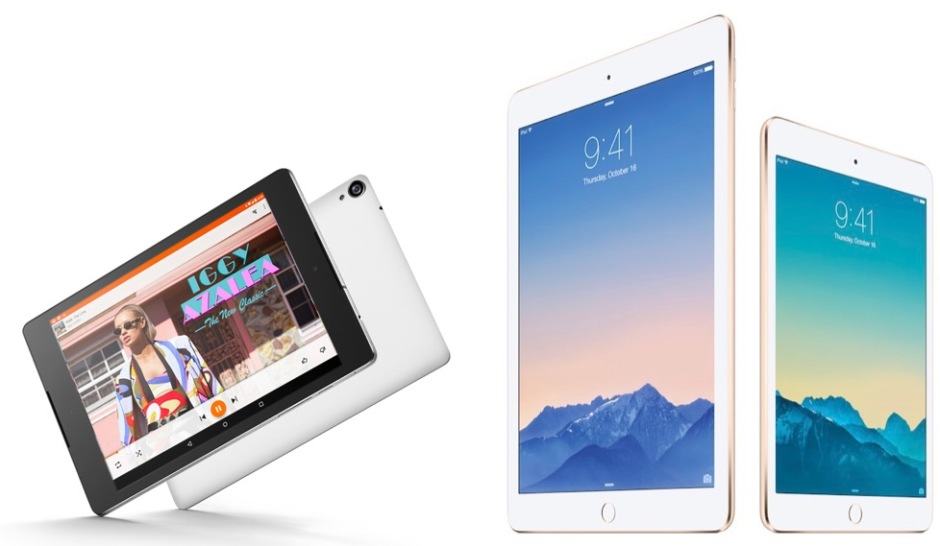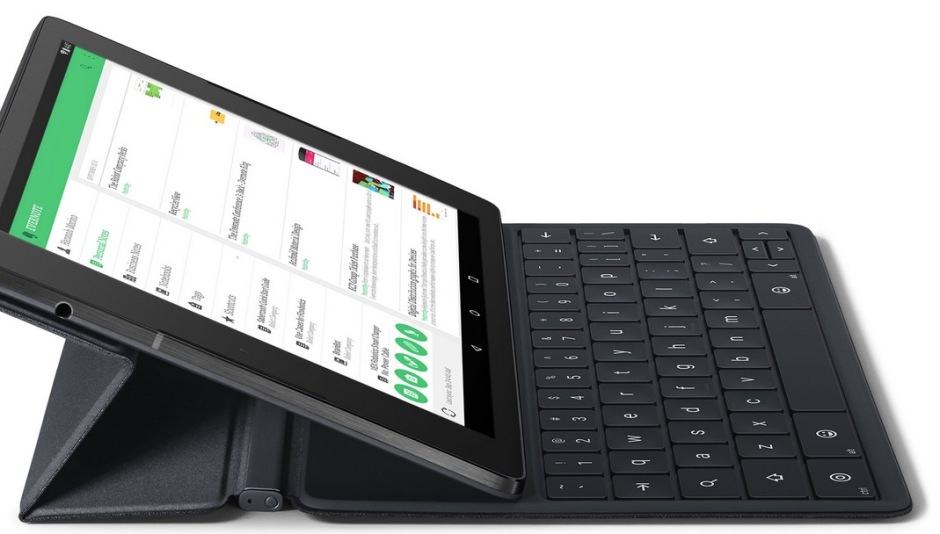Spec for spec: How Apple’s new iPads stack up to Nexus 9
With Apple and Google announcing new tablets this week, shopping for a new slate just got a lot more interesting. But how do you choose between the Nexus 9 and Apple’s new iPads? They all have the latest and greatest software and specifications, but they’re vasty different in a few key areas.
Our in-depth comparison below will help you choose which device is right for you.
Please scroll the table left and right to see all of its contents
| Nexus 9 | iPad Air 2 | iPad mini 3 | |
|---|---|---|---|
| Operating System | Android 5.0 Lollipop | iOS 8.1 | iOS 8.1 |
| Display | 8.9-inch IPS display (2048 x 1536) | 9.7-inch IPS display (2048 x 1536) | 7.85-inch IPS display (2048 x 1536) |
| PPI | 281 | 264 | 326 |
| Processor | 64-bit NVIDIA Tegra K1 at 2.3GHz | 64-bit Apple A8X | 64-bit Apple A7 |
| RAM | 2GB | 2GB | 1GB |
| Storage | 16GB, 32GB | 16GB, 64GB, 128GB | 16GB, 64GB, 128GB |
| Camera(s) | 8MP (rear) + 1.6MP (front) | 8MP (rear) + 1.2MP (front) | 5MP (rear) + 1.2MP (front) |
| Other | NFC | Touch ID, anti-reflective coating, Apple Pay, M8 motion co-processor | Touch ID, Apple Pay, M7 motion co-processor |
| Dimensions | 228.2 x 153.7 x 7.9mm | 240 x 169.5 x 6.1mm | 200 x 134.7 x 7.5mm |
| Weight | 425g | 437g | 331g |
| Battery | 6,700mAh | TBC | TBC |
Display
All three devices deliver the same display resolution, but because the iPad mini is smaller than the others, it boasts a higher pixel density. That means text, images, and everything else will be a little sharper, but because you won’t be holding any of these devices close to your face, the difference is going to be negligible for the vast majority; during normal use, all three are going to look just as crisp.
If you want to use your new tablet outdoors, however, then the iPad Air 2 is likely to look best. It’s the first iPad with Apple’s new antireflective coating, which promises to be “the least reflective tablet display in the world.”
Performance
It’s still too early to tell which of these tablets is going to be most powerful, because they all feature new processors that are yet to be put through their paces. There’s one thing you can be sure of, though: No matter which device you choose, you’re going to get an absolute powerhouse. Whether you’re into gaming, using multiple apps at once, or getting stuff done, these devices will do it all without so much as a stutter.
Storage
Android-powered devices typically have the upper hand when it comes to storage, because many of them have microSD card slots — but that’s not the case with the Nexus 9. The biggest storage option is 32GB, and that’s going to get filled up pretty quickly when you start installing the latest games and downloading music and movies.
The iPad doesn’t have a microSD card slot, either, but it does offer 64GB and 128GB storage options — and that’s going to be a major differentiator for a large number of consumers. If you’re an app addict or you like to watch your favorite shows and movies on your tablet — without streaming them — the iPad could well be the better option.
Software
By far the biggest difference between the Nexus 9 and the new iPads, however, is the software. The Nexus 9 is the first tablet to ship with Android 5.0 Lollipop, Google’s latest Android operating system which introduces Material Design, greater power efficiency, and lots of new features. The new iPads, on the other hand, run iOS 8.1.
The other differences we’ve already covered are going to be irrelevant to you if you have a platform preference. If you’re an Android lover who likes more freedom and a greater level of customization, you’re going to feel somewhat restrained and claustrophobic with iOS.

Nexus 9 comes with Lollipop pre-installed. Image: Google
Comparatively, if you’re used to iOS, where everything “just works” and you don’t need to tinker with anything to get it to work the way you want it, Android may not be for you. It’s also worth remembering that although Google Play now boasts more apps than the App Store, Android still has some way to go before the quality of those apps meets that of their iOS counterparts — particularly when it comes to tablet software.
Choosing
When deciding which tablet is right for you, then, we recommend choosing your platform first. Unless you’re adamant you want to switch, stick to what you know; remember that the apps you’ve bought on Android cannot be used on iOS, and vice-versa.
If you decide Android is best for you, then get the Nexus 9. If you prefer iOS, then it’s as easy as choosing which form factor best suits your needs. The iPad Air’s bigger display is better for watching movies and getting stuff done, but the iPad mini is more portable, and an ideal size for reading and playing games on the go.





